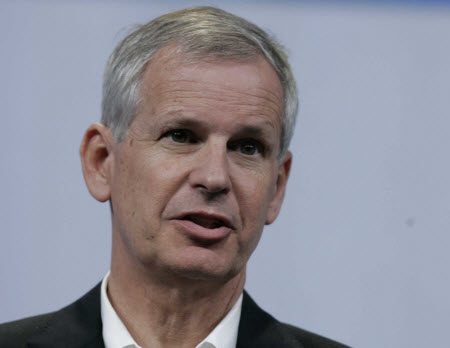Sling Aside, Ergen Sounds OTT Warning
The smarter way to stay on top of the multichannel video marketplace. Sign up below.
You are now subscribed
Your newsletter sign-up was successful

Dish Network chairman and CEO Charlie Ergen’s vision of a declining satellite business inched closer to reality in the third quarter, even as its Sling TV over-the-top service continued to gain momentum.
Officially Dish network lost about 23,000 net subscribers in the third quarter, almost double the 12,000 lost in the prior year, but that figure was a combination of satellite-TV losses and Sling TV gains. In reality, the satellite losses were much worse.
While OTT appears to be Dish’s future — Ergen said that he hoped its OTT customers were worth as much or more than a linear TV subscriber — he also fi red a warning shot to programmers who devalue their content by selling it to less-responsible OTT competitors.
In the past few weeks, two top content executives, Time Warner Inc. chairman and CEO Jeff Bewkes and The Walt Disney Co. chairman and CEO Bob Iger, have said they would consider holding back content from subscription video-on-demand companies such as Netflix, Hulu and Amazon Prime.
Content providers sometimes forget to consider the long-term implications of short-term gains, Ergen said.
LONG-TERM PAIN
“It’s easy to get to the end of the year, end of the quarter, and sell some content out of the back door and [not] think it’s going to hurt your core business in the short run, and you’ve got kind a one-quarter gain or you make your bonus,” Ergen said. “There’s always in a company a risk of short-term decisions.”
The smarter way to stay on top of the multichannel video marketplace. Sign up below.
Dish doesn’t break out the numbers, but several analysts estimated that the satellite business lost between 115,000 and 178,000 net customers, while Sling TV gained between 90,000 and 155,000 subscribers.
Dish launched Sling TV in February, its answer to millennial customers who have resisted the costly pay TV bundle. For $20 per month, Sling TV customers get about 20 channels (including ESPN) that can be streamed to a single device. Other genrebased programming packages, such as News and Information, Movies and Sports, are available for an additional $5 per month.
For the most part, analysts were encouraged by the Sling TV results, while at the same time disappointed in the rapid deceleration of the satellite-TV business.
MoffettNathanson principal and senior analyst Craig Moffett, after an early glitch when he pegged gains at a paltry 24,000 customers, estimated that Sling TV added 155,000 new homes in the period, giving it a total of about 395,000 subscribers. The third-quarter growth was below that of Sling TV’s initial first-quarter signups, but ahead of the second-quarter pace of 56,000 additions.
But Sling TV’s gains mean that satellite-TV losses were even heavier than first expected: about 178,000 by Moffett’s estimates, 115,000 to 123,000 by other analysts’ extrapolations.
Moffett said a 178,000 net subscriber decline would mean Dish is losing customers at a 3.7% annual rate, a pace he called “shocking.” In contrast, cable’s third-quarter losses implied a decline of 1.4% annually.
“The idea that Dish could be shrinking at that kind of pace is extraordinary,” Moffett wrote.
On a conference call with analysts and reporters, Ergen explained that the OTT business is a little different than linear TV because customers tend to move in and out of plans. “I think the future is probably pretty bright for OTT in general, and hopefully for Sling,” Ergen said.
On the wireless front, Ergen said Dish still has several options regarding the re-auctioning of spectrum it originally won through its relationship with so-called “designated entities” in the recent AWS-3 spectrum auction. Dish and its DEs had won about $10 billion worth of spectrum, but the Federal Communications Commission ruled that the bids were invalid and demanded that the entities either surrender the spectrum or pay $3.3 billion in discounts it received during the process. The DEs opted to return the spectrum.
EYEING RE-AUCTION
“We plan to participate in the re-auction of those licenses,” Ergen said.
But Dish’s stance on partnering with another carrier to build out a wireless network or licensing the spectrum to another carrier has appeared to change.
Ergen said the FCC’s decision to rescind the DE discounts and its intense focus on competition in the wireless market haven’t helped “the competitive side” of things. “And it makes us worry a little bit about where the government is going on decisions, because obviously, that decision was very beneficial to the two big incumbents.”
